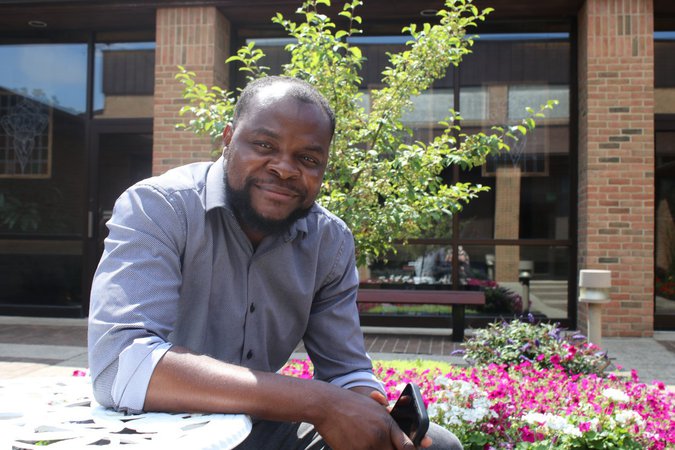Politics
Haitians in Springfield Face Uncertain Future as TPS Ends

SPRINGFIELD — The future of approximately 10,000 Haitians living in Springfield, Ohio, hangs in the balance as the U.S. government prepares to end their Temporary Protected Status (TPS). This decision has left many residents, including Viles Dorsainvil, anxious about their ability to remain in the country where they sought safety and opportunity. The TPS program, which granted legal status to individuals from countries facing unsafe conditions, is set to be revoked by February 2026.
Dorsainvil, a 39-year-old community leader and executive director of the Haitian Support Center, expressed his uncertainty: “It’s as if you are inviting me to come to your house, telling me I will be okay and everything will be fine. Then all of a sudden you start giving me cold shoulders.” Many in the Haitian community share his concern, especially after the U.S. Department of Homeland Security announced in June 2023 that it would end TPS for about 500,000 Haitians, citing improved conditions in Haiti.
The situation in Haiti, however, is far from stable. Since the assassination of President Jovenel Moïse in July 2021, violence has surged, with gangs reportedly gaining “near-total control” over the capital, according to a United Nations report. The country continues to struggle with severe political instability and economic hardship, exacerbated by the aftermath of a devastating earthquake in 2010.
Dorsainvil arrived in the United States in late 2020 after fleeing threats of kidnapping. Initially hesitant about staying, he later applied for TPS following the political turmoil in Haiti. He found employment at local Amazon warehouses and volunteered with various organizations, becoming an integral part of the Springfield community.
Community Response and Challenges Ahead
The influx of Haitians has been viewed positively by some local leaders. Carl Ruby, pastor of Central Christian Church, believes their arrival has revitalized Springfield, which had seen a population decline since its peak of 90,000 residents in the 1970s. “The first time we’d grown in 70 years is when Haitians showed up,” Ruby noted, emphasizing the contributions of the Haitian community to local manufacturing and economic recovery.
Despite this, the potential loss of TPS could lead to significant unemployment and exacerbate labor shortages in the region. Ohio Governor Mike DeWine has already expressed concerns about the ramifications of ending the program, stating, “It’s not going to be good.” Many Haitian residents are now at risk of losing their jobs as employers hesitate to retain them without the legal protections TPS offers.
As anxiety grows, some Haitians are exploring options to relocate to countries like Canada, which has a well-established Haitian diaspora. However, moving north often requires direct family connections, and some may resort to dangerous crossings, as evidenced by a recent incident where 44 individuals, primarily Haitians, were found in dire conditions in a truck in Quebec.
Faith and Solidarity in Springfield
In response to the escalating crisis, Springfield’s faith community is rallying to support Haitians facing the prospect of deportation. Ruby mentioned that churches are exploring ways to provide physical sanctuary if needed in the coming months. “I think obedience to Christ requires that we support immigrants and love them as we love ourselves and treat them like our brothers,” he stated.
The situation has prompted calls for Canada to reconsider the Safe Third Country Agreement, which mandates that refugees must make their claims in the country they first arrive in, operating under the assumption that both nations are equally safe. Melissa Claisse from the Welcome Collective in Montreal highlighted the inhumane conditions Haitians face in U.S. detention facilities, urging a reevaluation of policies towards Haitian refugees.
As the community braces for the impending changes, the fate of Springfield’s Haitian population remains uncertain. Many continue to hope for a resolution that will allow them to stay in the country they now call home, despite the challenges ahead.
-

 Politics3 months ago
Politics3 months agoSecwepemc First Nation Seeks Aboriginal Title Over Kamloops Area
-

 World7 months ago
World7 months agoScientists Unearth Ancient Antarctic Ice to Unlock Climate Secrets
-

 Top Stories1 month ago
Top Stories1 month agoUrgent Fire Erupts at Salvation Army on Christmas Evening
-

 Sports1 month ago
Sports1 month agoCanadian Curler E.J. Harnden Announces Retirement from Competition
-

 Lifestyle5 months ago
Lifestyle5 months agoManitoba’s Burger Champion Shines Again Amid Dining Innovations
-

 Top Stories2 months ago
Top Stories2 months agoFatal Crash on Highway 11 Claims Three Lives, Major Closure Ongoing
-

 Entertainment7 months ago
Entertainment7 months agoTrump and McCormick to Announce $70 Billion Energy Investments
-

 Science7 months ago
Science7 months agoFour Astronauts Return to Earth After International Space Station Mission
-

 Lifestyle7 months ago
Lifestyle7 months agoTransLink Launches Food Truck Program to Boost Revenue in Vancouver
-

 Technology5 months ago
Technology5 months agoApple Notes Enhances Functionality with Markdown Support in macOS 26
-

 Top Stories1 month ago
Top Stories1 month agoBlue Jays Sign Kazuma Okamoto: Impact on Bo Bichette’s Future
-

 Top Stories2 months ago
Top Stories2 months agoNHL Teams Inquire About Marc-André Fleury’s Potential Return





















